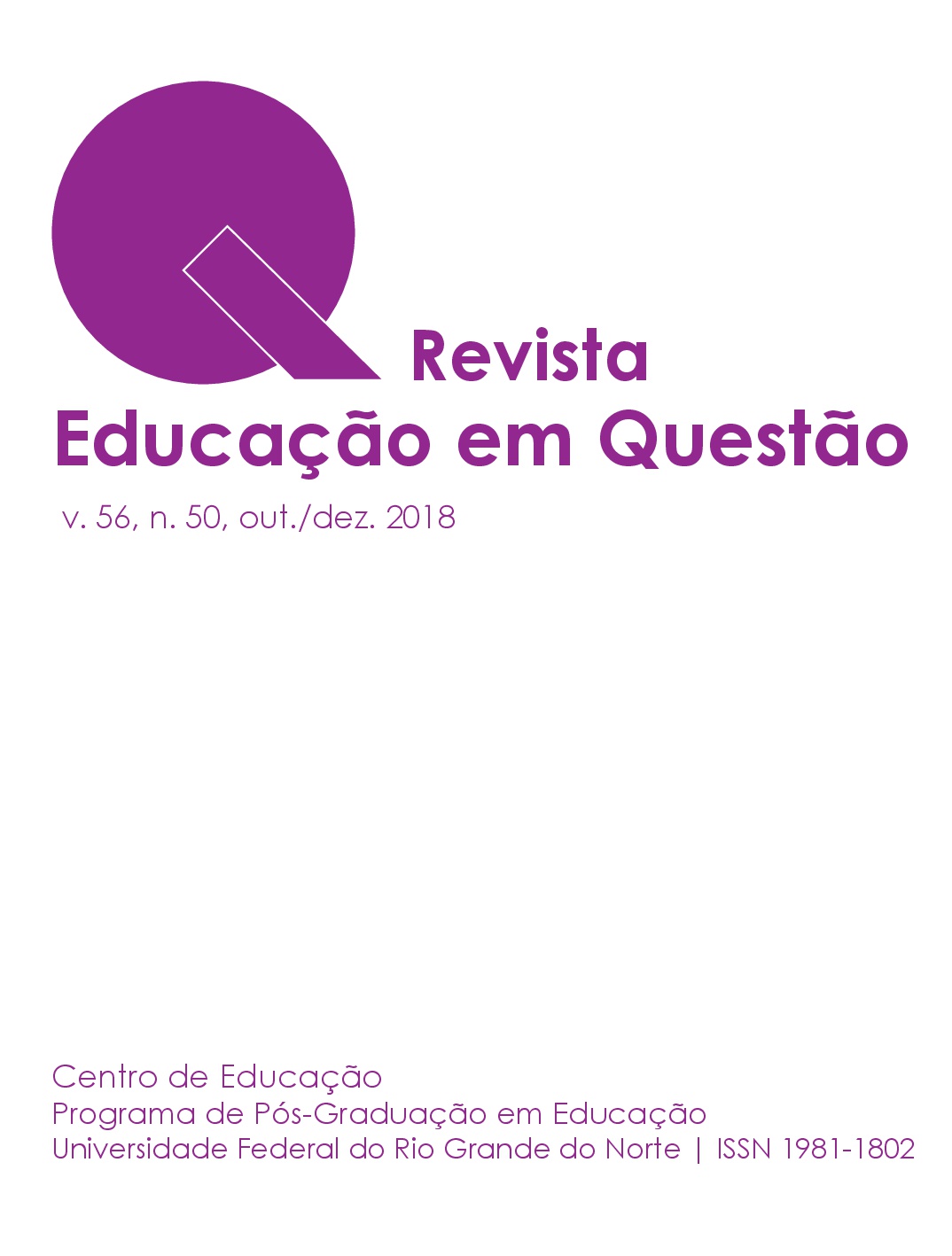Imaginário coletivo e memes nas redes sociais digitais:
o caso da Escola da Depressão
DOI:
https://doi.org/10.21680/1981-1802.2018v56n50ID14459Palavras-chave:
Escola, Redes sociais, Memes, Imaginário coletivoResumo
O presente trabalho busca compreender a articulação entre a constituição de um imaginário coletivo sobre a escola e sua materialização no gênero discursivo “meme”, nas redes sociais digitais. Trata-se de um estudo orientado pela etnografia virtual, com base em um corpus analítico situado na página do Facebook Escola da Depressão. Entre janeiro e março de 2017, foram realizadas imersões no espaço virtual com o objetivo de observar as práticas de uso e analisar os memes, publicados na página em foco. O panorama estudado indica que suas manifestações discursivas realçam, quase sempre, uma visão pessimista sobre a escola, a qual não é percebida como espaço para manifestação de valores igualitários e liberdade de pensamento. Com base na perspectiva dos estudantes, essas materialidades enunciam situações que caracterizam, ressignificam e criticam o cotidiano escolar com o uso do humor; deslegitimam o papel educacional e transformador da escola, mas não apresentam propostas para possíveis rupturas com o modelo imposto.
Downloads
Referências
ABRIC, Jean-Claude. Pratiques sociales et représentations. Paris: Presses Universitaires de France, 1994.
ALVES-MAZZOTTI, Alda Judith. Representações sociais: desenvolvimentos atuais e aplicações à educação. In: CANDAU, Vera Maria. (Org.). Linguagem: espaços e tempo no ensinar e aprender. Rio de Janeiro, DP&A, 2000.
ARISTIMUÑO, Felipe. O meme como expressão popular no ensino de arte alguns pensamentos e conceitos base do projeto de pesquisa evms. São Paulo: Revista digital ART, 2014.
BACHELARD, Gaston. A água e os sonhos: ensaio sobre a imaginação da matéria. São Paulo: Martins Fontes, 1998.
BARICHELLO, Eugenia Maria; OLIVEIRA, Cristiane. O marketing viral como estratégia publicitária nas novas ambiências midiáticas. Em Questão, Porto Alegre, 2010.
BARDIN, Laurence. Análise de conteúdo. Edições 70, Lisboa, 1977.
BLACKMORE, Susan. The meme machine. Oxford, Reino Unido: Oxford University Press, 2000.
BURGESS, Jean. GREEN, Joshua. YouTube e a revolução digital: como o maior fenômeno da cultura participativa transformou a mídia e a sociedade. São Paulo: Aleph, 2009.
CARRINGTON, P. J.; SCOTT, J.; WASSERMAN, S. Models and methods in social networkanalysis. Cambridge: Cambridge University Press, 2005.
CASTELLS, Manuel. A galáxia da internet: reflexões sobre a Internet, os negócios e a sociedade. Rio de Janeiro, Oxford University Press, 2006.
CORDEIRO. William Robson; COSTA, Luciano. Jornalismo imersivo: Perspectivas para novos formatos. Leituras do Jornalismo, FAAC-UNESP, São Paulo, 2016.
CARDOSO, Gustavo. A mídia na sociedade em rede: filtros, vitrines, notícias. Rio de Janeiro: FGV, 2007.
DAWKINS, Richard. O gene egoísta. Editora Gradiva, Portugal, 1979.
DENNETT, Daniel. Darwin's Dangerous Idea. London: Penguin 1996.
DURAND, Gilbert. As estruturas antropológicas do imaginário: introdução à arquetipologia. São Paulo: Martins Fontes, 1997.
DURAND, Gilbert. La foi ducordonnier. Paris: Denoël, 1984.
FONTANELLA, Fernando Israel. O que é um meme na Internet? Proposta para uma problemática da memesfera. In: SIMPÓSIO NACIONAL (ABCiber), 3; 2009, São Paulo. Anais... São Paulo: III Simpósio Nacional da ABCiber, 2009.
FOUCAULT, Michel. Vigiar e punir: a história da violência nas prisões. Petrópolis: Vozes, 1999.
FOUCAULT, Michel. A hermenêutica do sujeito. São Paulo: Martins Fontes, 2010.
HINE. Cristine. Etnografía virtual. Barcelona: Editora UOC, 2004.
JENKINS, Henry. Cultura da convergência. São Paulo: Aleph, 2009.
JUSTO, José Sterza. Humor, educação e pós-modernidade. In: ARANTES, Valéria Amorin. (Org.). Humor e alegria na educação. São Paulo: Summus, 2006.
LACAN, Jacques. O simbólico, o imaginário e o real. Em Nomes-do-Pai. Rio de Janeiro, 2005.
LÉVY, Pierre. Cibercultura. São Paulo: Editora 34, 2000.
MARTINO, Luis Mauro Sá. Teoria das mídias digitais: linguagens, ambientes, redes. 2. Petrópolis, RJ: Vozes, 2015.
MAFFESOLI, Michel. A transfiguração do político: a tribalização do mundo. Porto Alegre: Sulina, 2001.
MARTINS, Tatiane Marques de Oliveira. A netnografia como metodologia para conhecer o trabalho de professores da cultura digital. UNIESPE, 2012. Disponível em: <https://goo.gl/y3Xn8b> Acesso em: 23 jul. 2017.
MAUSS, Marcel. Sociologia e antropologia. São Paulo: Cosac &Naify, 2003.
MOSCOVICI, Serge. A representação social da psicanálise. Tradução Álvaro Cabral. Rio de Janeiro: Zahar, 1978.
NIMROD, Galit. The funculture in seniors’ online communities. The Gerontologist, 2011. Disponível em: <https://goo.gl/qo95x3> Acesso em: 16 out. 2016.
PERUZZO, Cicilia. Comunidades em tempo de redes. Comunicação e movimentos populares: quais redes, 2002. Disponível em: <https://goo.gl/PiFKpM> Acesso em: 1 jan. 18.
POSSENTI, Sírio. Os humores da língua: análises lingüísticas de piadas. Campinas: Mercado de Letras, 2005.
RECUERO, Raquel. Redes sociais na internet. Porto Alegre: Sulina, 2009.
RICOEUR, Paul. Reconstruir a universidade. Rio de Janeiro: Revista Paz e Terra/ Editora Civilização Brasileira, 1969.
SAVIANI, Dermeval. A nova lei da educação: trajetória, limites e perspectivas. Campinas: Autores Associados, 2004.
SCHUABB, Paula Alexandre. Memes de internet e suas temporalidades de produção o e consumo. Rio de Janeiro: SPGD, 2016.
SHIFMAN, Limor. Memes in digital culture. Massachusetts: MIT Press, 2013.
SOUZA, Carlos Fabiano de. Memes: formações discursivas que ecoam no ciberespaço. Campos dos Goytacazes: VÉRTICES, 2013.
SOUZA, Luciana. Com a palavra, a imagem. Revista Virtual de Letras, 2009. Disponível em: <https://goo.gl/igsfuc> Acesso em: 3 nov. 2017.
TORRES, Claudio. A bíblia do marketing digital. São Paulo: Novatec, 2009.
VALE, Lilian do. A escola imaginária. Rio de Janeiro: DP&Editora, 1997.
VAN LEEUWEN, Theo. Multimodality. In: SIMPSON, James. (Ed.). New York: Routledge, 2011.
WASSERMAN, Stanley; FAUST, Katherine. Social network analysis. MethodsandApplications. Cambridge, UK: Cambridge University Press, 1994.
Downloads
Publicado
Como Citar
Edição
Seção
Licença
À Revista Educação em Questão ficam reservados os direitos autorais no tocante a todos os artigos nela publicados.
A Revista Educação em Questão reserva-se ao direito de não publicar artigos e resenhas de mesma autoria (ou em co-autoria) em intervalos inferiores há 1 (um) ano.






